Hãy nhập câu hỏi của bạn vào đây, nếu là tài khoản VIP, bạn sẽ được ưu tiên trả lời.

a: Ta có: \(\left(2x+1\right)^2-4\left(x+2\right)^2=9\)
\(\Leftrightarrow4x^2+4x+1-4x^2-16x-16=9\)
\(\Leftrightarrow-12x=24\)
hay x=-2
b: Ta có: \(\left(x+3\right)^2-\left(x-4\right)\left(x+8\right)=1\)
\(\Leftrightarrow x^2+6x+9-x^2-4x+32=1\)
\(\Leftrightarrow2x=-40\)
hay x=-20

Bài 1
a) 5x²y - 20xy²
= 5xy(x - 4y)
b) 1 - 8x + 16x² - y²
= (1 - 8x + 16x²) - y²
= (1 - 4x)² - y²
= (1 - 4x - y)(1 - 4x + y)
c) 4x - 4 - x²
= -(x² - 4x + 4)
= -(x - 2)²
d) x³ - 2x² + x - xy²
= x(x² - 2x + 1 - y²)
= x[(x² - 2x+ 1) - y²]
= x[(x - 1)² - y²]
= x(x - 1 - y)(x - 1 + y)
= x(x - y - 1)(x + y - 1)
e) 27 - 3x²
= 3(9 - x²)
= 3(3 - x)(3 + x)
f) 2x² + 4x + 2 - 2y²
= 2(x² + 2x + 1 - y²)
= 2[(x² + 2x + 1) - y²]
= 2[(x + 1)² - y²]
= 2(x + 1 - y)(x + 1 + y)
= 2(x - y + 1)(x + y + 1)
Bài 2:
a: \(x^2\left(x-2023\right)+x-2023=0\)
=>\(\left(x-2023\right)\left(x^2+1\right)=0\)
mà \(x^2+1>=1>0\forall x\)
nên x-2023=0
=>x=2023
b:
ĐKXĐ: x<>0
\(-x\left(x-4\right)+\left(2x^3-4x^2-9x\right):x=0\)
=>\(-x\left(x-4\right)+2x^2-4x-9=0\)
=>\(-x^2+4x+2x^2-4x-9=0\)
=>\(x^2-9=0\)
=>(x-3)(x+3)=0
=>\(\left[{}\begin{matrix}x-3=0\\x+3=0\end{matrix}\right.\Leftrightarrow\left[{}\begin{matrix}x=3\\x=-3\end{matrix}\right.\)
c: \(x^2+2x-3x-6=0\)
=>\(\left(x^2+2x\right)-\left(3x+6\right)=0\)
=>\(x\left(x+2\right)-3\left(x+2\right)=0\)
=>(x+2)(x-3)=0
=>\(\left[{}\begin{matrix}x+2=0\\x-3=0\end{matrix}\right.\Leftrightarrow\left[{}\begin{matrix}x=3\\x=-2\end{matrix}\right.\)
d: 3x(x-10)-2x+20=0
=>\(3x\left(x-10\right)-\left(2x-20\right)=0\)
=>\(3x\left(x-10\right)-2\left(x-10\right)=0\)
=>\(\left(x-10\right)\left(3x-2\right)=0\)
=>\(\left[{}\begin{matrix}x-10=0\\3x-2=0\end{matrix}\right.\Leftrightarrow\left[{}\begin{matrix}x=\dfrac{2}{3}\\x=10\end{matrix}\right.\)
Câu 1:
a: \(5x^2y-20xy^2\)
\(=5xy\cdot x-5xy\cdot4y\)
\(=5xy\left(x-4y\right)\)
b: \(1-8x+16x^2-y^2\)
\(=\left(16x^2-8x+1\right)-y^2\)
\(=\left(4x-1\right)^2-y^2\)
\(=\left(4x-1-y\right)\left(4x-1+y\right)\)
c: \(4x-4-x^2\)
\(=-\left(x^2-4x+4\right)\)
\(=-\left(x-2\right)^2\)
d: \(x^3-2x^2+x-xy^2\)
\(=x\left(x^2-2x+1-y^2\right)\)
\(=x\left[\left(x^2-2x+1\right)-y^2\right]\)
\(=x\left[\left(x-1\right)^2-y^2\right]\)
\(=x\left(x-1-y\right)\left(x-1+y\right)\)
e: \(27-3x^2\)
\(=3\left(9-x^2\right)\)
\(=3\left(3-x\right)\left(3+x\right)\)
f: \(2x^2+4x+2-2y^2\)
\(=2\left(x^2+2x+1-y^2\right)\)
\(=2\left[\left(x^2+2x+1\right)-y^2\right]\)
\(=2\left[\left(x+1\right)^2-y^2\right]\)
\(=2\left(x+1+y\right)\left(x+1-y\right)\)

a) Ta có: \(8x\left(2x-3\right)-4x\left(4x+3\right)=72\)
\(\Leftrightarrow16x^2-24x-16x^2-12x=72\)
\(\Leftrightarrow-36x=72\)
hay x=-2
b) Ta có: \(\left(x+2\right)\left(x+4\right)-x\left(x+2\right)=104\)
\(\Leftrightarrow x^2+6x+8-x^2-2x=104\)
\(\Leftrightarrow4x=96\)
hay x=24
c) Ta có: \(\left(x-1\right)\left(x+4\right)-x\left(x-1\right)=308\)
\(\Leftrightarrow x^2+3x-4-x^2+x=308\)
\(\Leftrightarrow4x=312\)
hay x=78
d) Ta có: \(15x\left(2x-3\right)-\left(5x+2\right)\left(6x-5\right)=-22\)
\(\Leftrightarrow30x^2-45x-30x^2+25x-12x+10=-22\)
\(\Leftrightarrow-32x=-32\)
hay x=1

a,x(x-2)+x-2=0
⇔ (x-2)(x+1)=0
⇔ x=2;x=-1
b,x3+x2+x+1=0
⇔ x2(x+1)+x+1=0
⇔ (x+1)(x2+1)=0
⇔ x=-1

Bài 1:
a: Ta có: \(A=\left(k-4\right)\left(k^2+4k+16\right)-\left(k^3+128\right)\)
\(=k^3-64-k^3-128\)
=-192
b: Ta có: \(B=\left(2m+3n\right)\left(4m^2-6mn+9n^2\right)-\left(3m-2n\right)\left(9m^2+6mn+4n^2\right)\)
\(=8m^3+27n^3-27m^3+8n^3\)
\(=-19m^3+35n^3\)
Bài 4:
a: Ta có: \(\left(x-1\right)^3+\left(2-x\right)\left(4+2x+x^2\right)+3x\left(x+2\right)=16\)
\(\Leftrightarrow x^3-3x^2+3x-1+8-x^3+3x^2+6x=16\)
\(\Leftrightarrow9x=9\)
hay x=1
b: ta có: \(\left(x+2\right)\left(x^2-2x+4\right)-x\left(x^2-2\right)=15\)
\(\Leftrightarrow x^3+8-x^3+2x=15\)
\(\Leftrightarrow2x=7\)
hay \(x=\dfrac{7}{2}\)

a) \(\left(x+2\right)^2=4\left(2x-1\right)^2\)
\(\left(x+2\right)^2-4\left(2x-1\right)^2=0\)
\(\left(x+2\right)^2-\left[2\left(2x-1\right)\right]^2=0\)
\(\left(x+2\right)^2-\left(4x-2\right)^2=0\)
\(\left(x+2-4x+2\right)\left(x+2+4x-2\right)=0\)
\(6x\left(-3x+4\right)=0\)
\(\Rightarrow6x=0\) hoặc \(-3x+4=0\)
*) \(6x=0\)
\(x=0\)
*) \(-3x+4=0\)
\(3x=4\)
\(x=\dfrac{4}{3}\)
Vậy \(x=0;x=\dfrac{4}{3}\)
b) \(4x\left(x-2019\right)-x+2019=0\)
\(4x\left(x-2019\right)-\left(x-2019\right)=0\)
\(\left(x-2019\right)\left(4x-1\right)=0\)
\(\Rightarrow x-2019=0\) hoặc \(4x-1=0\)
*) \(x-2019=0\)
\(x=2019\)
*) \(4x-1=0\)
\(4x=1\)
\(x=\dfrac{1}{4}\)
Vậy \(x=\dfrac{1}{4};x=2019\)

e: Ta có: \(\left(x+2\right)\left(x^2-2x+4\right)-x\left(x^2+2\right)=15\)
\(\Leftrightarrow x^3+8-x^3-2x=15\)
\(\Leftrightarrow2x=-7\)
hay \(x=-\dfrac{7}{2}\)
f: Ta có: \(x^3-6x^2+12x-19=0\)
\(\Leftrightarrow x^3-6x^2+12x-8-11=0\)
\(\Leftrightarrow\left(x-2\right)^3=11\)
hay \(x=\sqrt[3]{11}+2\)
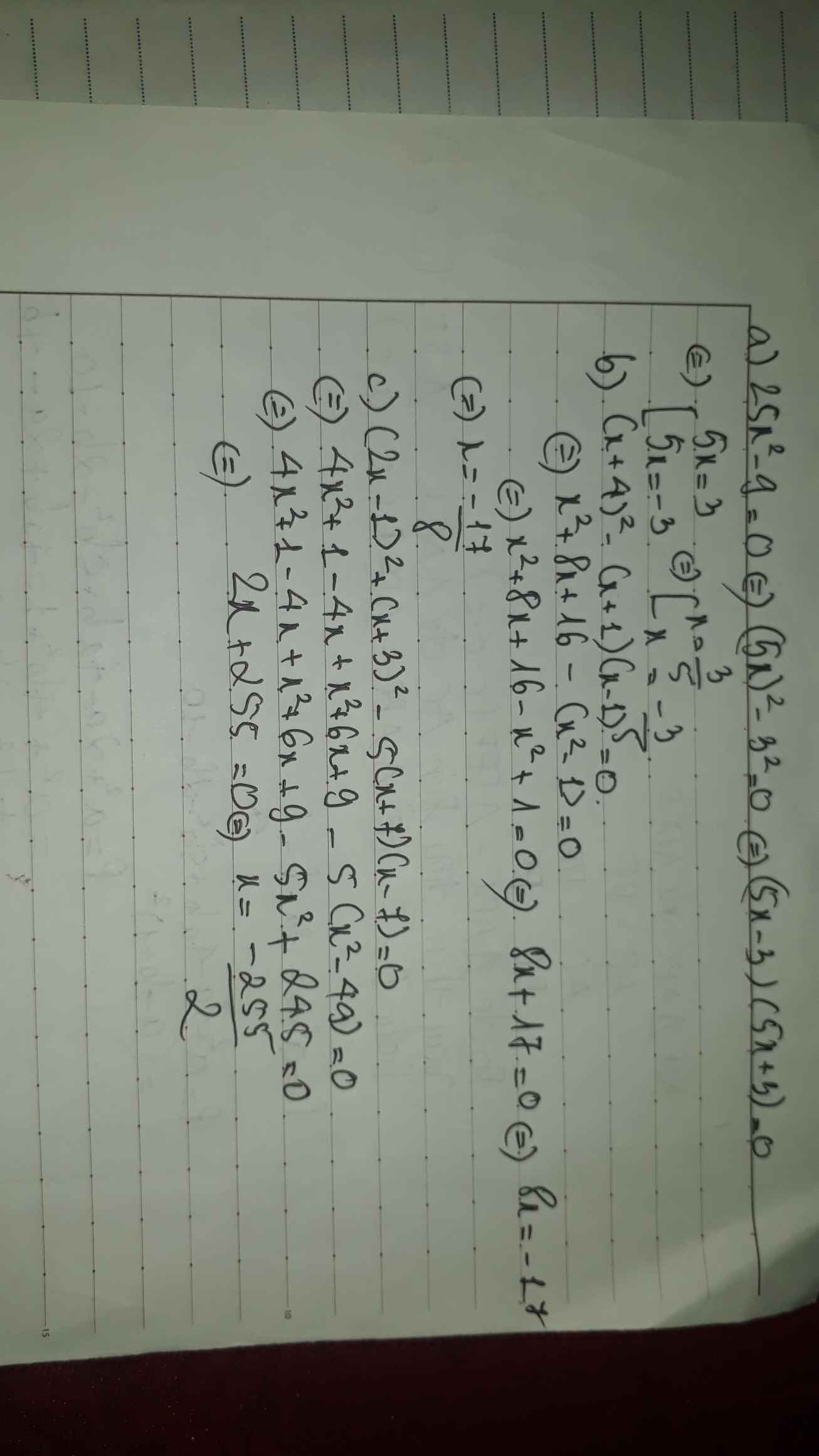
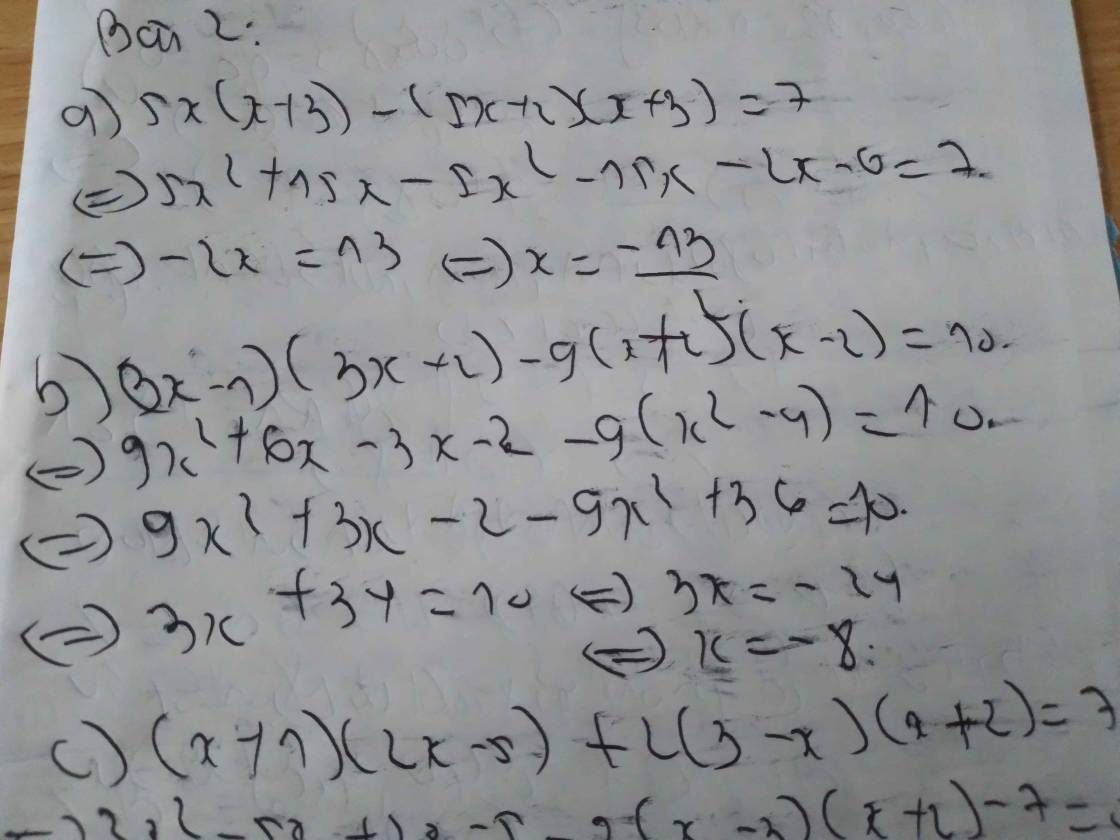
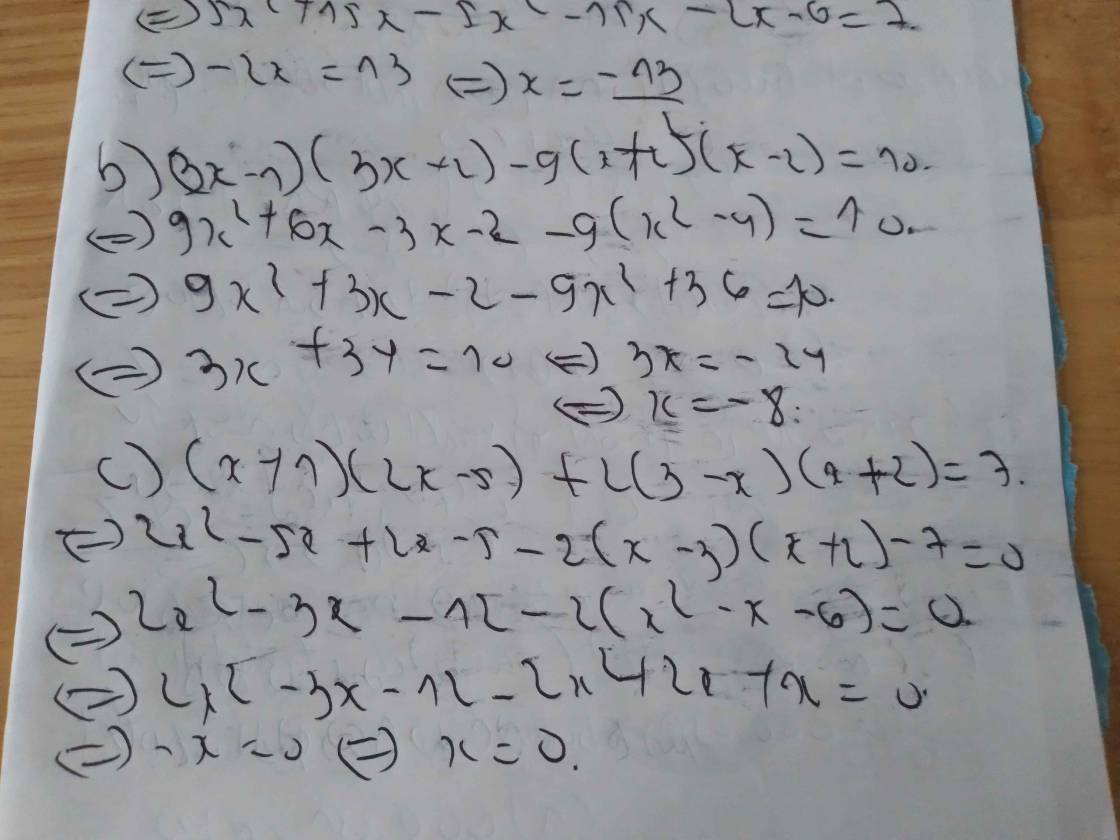
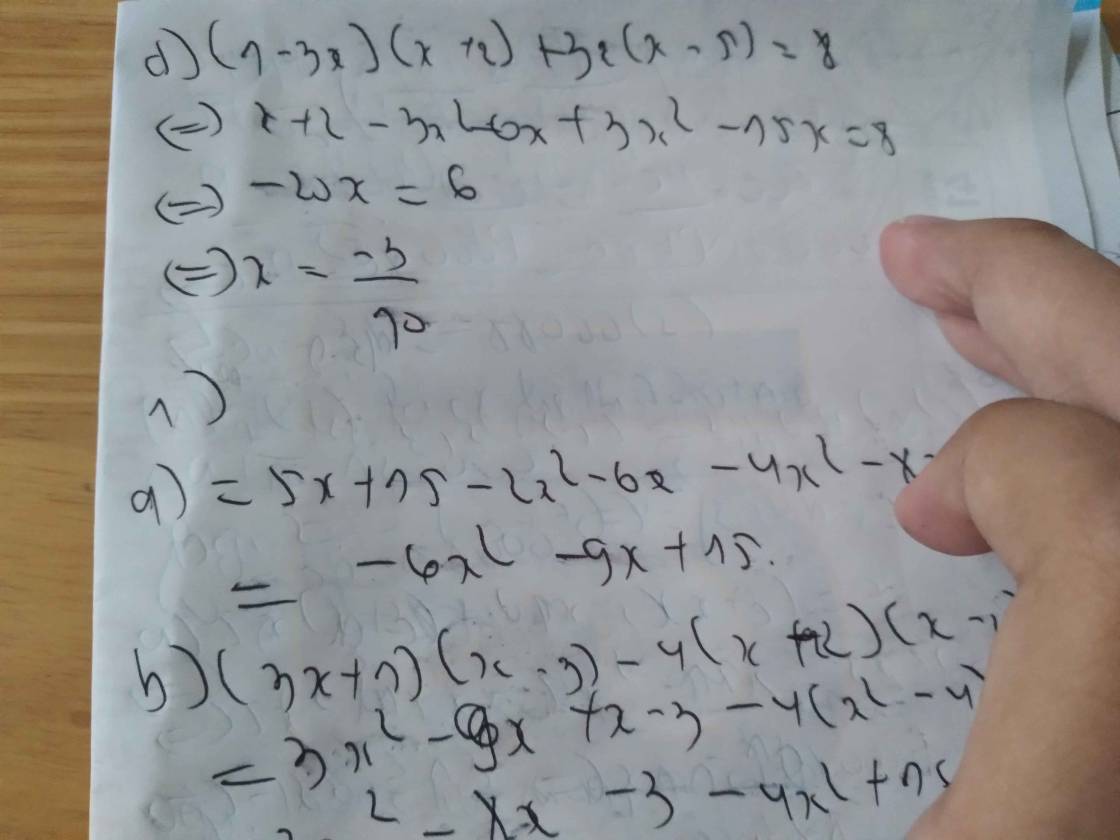
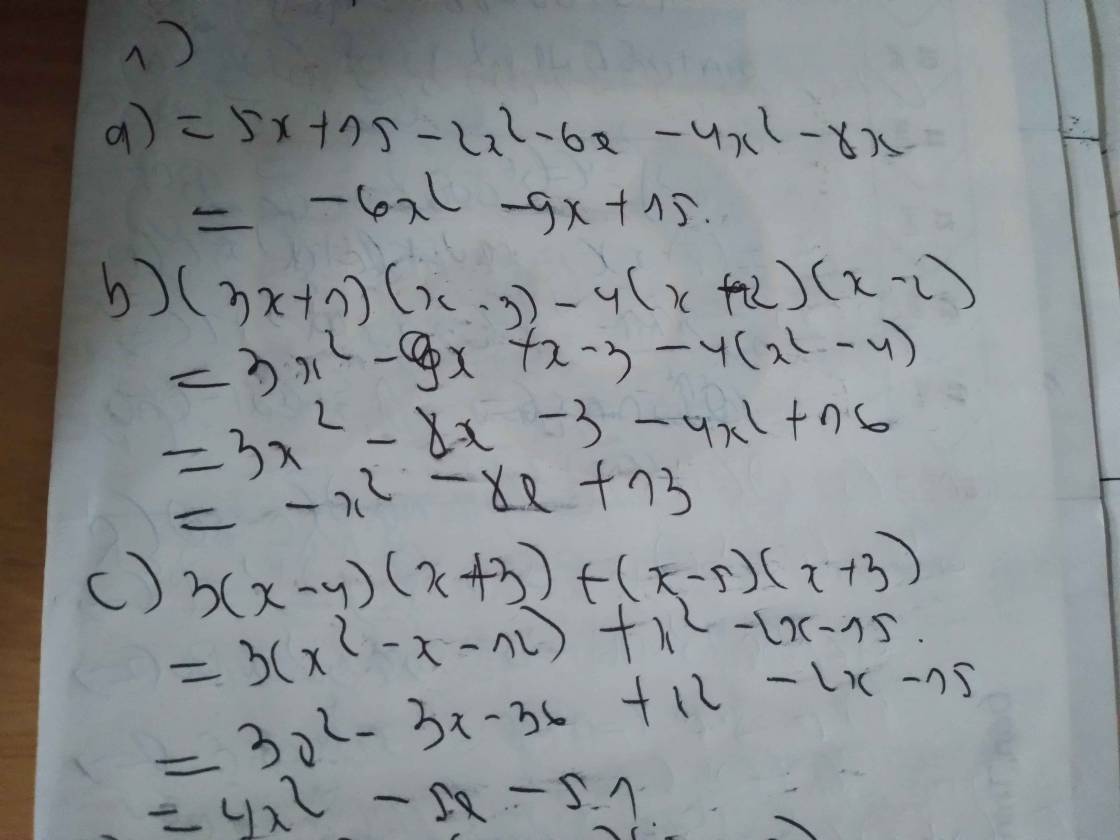
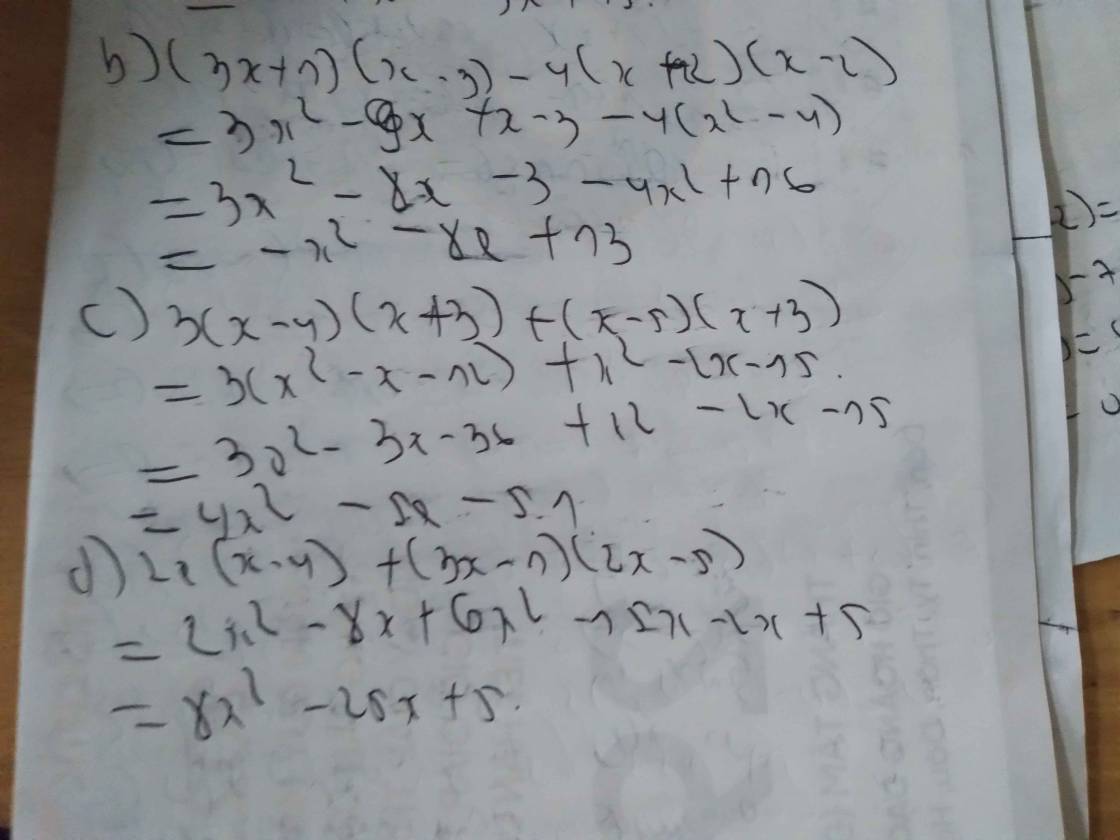
a, \(\left(x+4\right)^2-\left(x+1\right)\left(x-1\right)=16\)
\(\Leftrightarrow x^2+8x+16-x^2+1=16\Leftrightarrow8x+1=0\Leftrightarrow x=-\dfrac{1}{8}\)
Ta có: \(\left(x+4\right)^2-\left(x+1\right)\left(x-1\right)=16\)
\(\Leftrightarrow x^2+8x+16-x^2+1=16\)
\(\Leftrightarrow8x=-1\)
hay \(x=-\dfrac{1}{8}\)